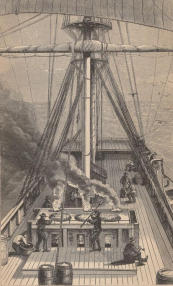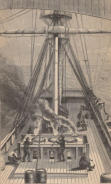“You
are
the
light
of
the
world.
A
city
set
on
a
hill
cannot
be
hidden.
Nor
do
men
light
a
lamp,
and
put
it
under
the
peck-measure,
but
on
the
lampstand;
and
it
gives
light
to
all
who
are
in
the
house.
Let
your
light
shine
before
men
in
such
a
way
that
they
may
see
your
good
works,
and
glorify
your
Father
who
is
in
heaven.
…
The
lamp
of
the
body
is
the
eye;
if
therefore
your
eye
is
clear,
your
whole
body
will
be
full
of
light.
But
if
your
eye
is
bad,
your
whole
body
will
be
full
of
darkness.
If
therefore
the
light
that
is
in
you
is
darkness,
how
great
is the darkness!” (Matthew 5:14-16; 6:22,23)
George Washington’s “Heavy” Light Bill
People
crave
light.
Darkness
was
once
crippling.
It
filled
half
a
person’s
life
and
brought
it
to
a
standstill.
Jesus
confirmed
this
with
the
observation,
“…
Night
is
coming,
when
no
man
can
work”
(Jn.
9:4b).
Furthermore,
darkness
is
the
arena
where
unseen
terrors
suddenly
pounce
and
overwhelm
and
rob
their
victims
of
property
and
life
(1
Thess.
5:2).
The
night
represented everything malignant (Eph. 6:12).
Yet,
not
long
ago,
people
lived
in
a
world
enshrouded
by
darkness
with
the
descent
of
each
day’s
sun.
All
that
stood
between
them
and
the
dangers
of
the
night
was
the
dim
flicker
of
light
from
a
fireplace
or
candle.
Nighttime
confined
people
to
their
homes,
from
which
they
ventured
forth
only
at
some
hazard
to
their
safety.
People
today
are
so
accustomed
to
getting
a
flood
of
cheap
electric
light
with
the
mere
flip
of
a
switch
that
they
can
hardly
appreciate
it
as
a
“luxury”
which
people
have
enjoyed
only
in
the
last
century
or
so.
Before
then,
people
relied
on
candles made from animal fat to provide small, smoky, and smelly light.
In
the
1700’s,
it
was
found
that
the
sperm
whale’s
head
yielded
a
white,
oily
substance
which,
when
converted
into
candles,
burned
with
a
clean,
white,
strong
light.
Cost
was
their
only
drawback.
Yet,
their
superior
light
was
so
highly
regarded
that
those
who
could
afford
them
were
willing
to
pay
huge
sums.
“George
Washington
estimated
that
he
spent
$15,000
a
year in today’s currency burning spermaceti candles” (
How We Got to Now
, pg. 202).
How
wonderful
it
would
be
if
people
so
valued
spiritual
light
that
they,
likewise,
would
be
willing
to
“pay
any
price”
to
have
it.
Yet,
as
odd
as
it
might
seem,
they
prefer
to
walk
in
the
darkness
of
sin,
hoping
to
stumble
across
whatever
pleasures
it
might
afford
them.
As
John
said,
“…
Men
loved
the
darkness
rather
than
the
light;
for
their
deeds
were
evil.
For
everyone
who
does
evil
hates
the
light,
and
does
not
come
to
the
light,
lest
his
deeds
should
be
exposed”
(Jn.
3:19,
20).
Too
late
do
they
find
that
the
darkness
they
enjoyed
eventually
terrorizes
them
and
ultimately
leads
to
“the
black
darkness”
which
is
forever
unrelieved
by
light
(Jude
13).
The
pleasures
of
sin
are
only
for
a
“season”
(Heb.
11:25,
KJV).
Yet,
Jesus
proclaimed
Himself
to
be
“the
light
of
the
world”
(Jn.
8:12;
9:12).
His
followers
do
not
walk
in
the
darkness
of
ignorance
and
depravity.
Scripture
often
uses
the
metaphor
of
light
and
darkness
to
describe
the
contrast
between
sin
and
righteousness
but
perhaps
nowhere
more
elaborately
than
Paul
does
when
he
writes:
“The
night
is
almost
gone,
and
the
day
is
at
hand.
Let
us
therefore
lay
aside
the
deeds
of
darkness
and
put
on
the
armor
of
light.
Let
us
behave
properly
as
in
the
day,
not
in
carousing
and
drunkenness,
not
in
sexual
promiscuity
and
sensuality,
not
in
strife
and
jealousy”
(Rom.
13:12,13).
Yes,
Jesus
offers
a
clear,
bright
light
to
which
there
is
no
superior,
and
which
never
burns
out.
To
the
soul
who
is
fearful
and
wearied
of
the
darkness
which
has
filled
his
life,
Jesus
says, “Come to the light.” Whatever one has to give up to get this light, it is all worth it!










“You
are
the
light
of
the
world.
A
city
set
on
a
hill
cannot
be
hidden.
Nor
do
men
light
a
lamp,
and
put
it
under
the
peck-measure,
but
on
the
lampstand;
and
it
gives
light
to
all
who
are
in
the
house.
Let
your
light
shine
before
men
in
such
a
way
that
they
may
see
your
good
works,
and
glorify
your
Father
who
is
in
heaven.
…
The
lamp
of
the
body
is
the
eye;
if
therefore
your
eye
is
clear,
your
whole
body
will
be
full
of
light.
But
if
your
eye
is
bad,
your
whole
body
will
be
full
of
darkness.
If
therefore
the
light
that
is
in
you
is
darkness, how great is the darkness!” (Matthew 5:14-16; 6:22,23)
George Washington’s “Heavy” Light Bill
People
crave
light.
Darkness
was
once
crippling.
It
filled
half
a
person’s
life
and
brought
it
to
a
standstill.
Jesus
confirmed
this
with
the
observation,
“…
Night
is
coming,
when
no
man
can
work”
(Jn.
9:4b).
Furthermore,
darkness
is
the
arena
where
unseen
terrors
suddenly
pounce
and
overwhelm
and
rob
their
victims
of
property
and
life
(1
Thess.
5:2).
The
night
represented
everything
malignant
(Eph. 6:12).
Yet,
not
long
ago,
people
lived
in
a
world
enshrouded
by
darkness
with
the
descent
of
each
day’s
sun.
All
that
stood
between
them
and
the
dangers
of
the
night
was
the
dim
flicker
of
light
from
a
fireplace
or
candle.
Nighttime
confined
people
to
their
homes,
from
which
they
ventured
forth
only
at
some
hazard
to
their
safety.
People
today
are
so
accustomed
to
getting
a
flood
of
cheap
electric
light
with
the
mere
flip
of
a
switch
that
they
can
hardly
appreciate
it
as
a
“luxury”
which
people
have
enjoyed
only
in
the
last
century
or
so.
Before
then,
people
relied
on
candles
made
from
animal
fat
to
provide small, smoky, and smelly light.
In
the
1700’s,
it
was
found
that
the
sperm
whale’s
head
yielded
a
white,
oily
substance
which,
when
converted
into
candles,
burned
with
a
clean,
white,
strong
light.
Cost
was
their
only
drawback.
Yet,
their
superior
light
was
so
highly
regarded
that
those
who
could
afford
them
were
willing
to
pay
huge
sums.
“George
Washington
estimated
that
he
spent
$15,000
a
year
in
today’s
currency
burning
spermaceti
candles”
(
How
We
Got
to
Now
,
pg.
202).
How
wonderful
it
would
be
if
people
so
valued
spiritual
light
that
they,
likewise,
would
be
willing
to
“pay
any
price”
to
have
it.
Yet,
as
odd
as
it
might
seem,
they
prefer
to
walk
in
the
darkness
of
sin,
hoping
to
stumble
across
whatever
pleasures
it
might
afford
them.
As
John
said,
“…
Men
loved
the
darkness
rather
than
the
light;
for
their
deeds
were
evil.
For
everyone
who
does
evil
hates
the
light,
and
does
not
come
to
the
light,
lest
his
deeds
should
be
exposed”
(Jn.
3:19,
20).
Too
late
do
they
find
that
the
darkness
they
enjoyed
eventually
terrorizes
them
and
ultimately
leads
to
“the
black
darkness”
which
is
forever
unrelieved
by
light
(Jude
13).
The
pleasures
of
sin
are
only
for
a
“season”
(Heb.
11:25,
KJV).
Yet,
Jesus
proclaimed
Himself
to
be
“the
light
of
the
world”
(Jn.
8:12;
9:12).
His
followers
do
not
walk
in
the
darkness
of
ignorance
and
depravity.
Scripture
often
uses
the
metaphor
of
light
and
darkness
to
describe
the
contrast
between
sin
and
righteousness
but
perhaps
nowhere
more
elaborately
than
Paul
does
when
he
writes:
“The
night
is
almost
gone,
and
the
day
is
at
hand.
Let
us
therefore
lay
aside
the
deeds
of
darkness
and
put
on
the
armor
of
light.
Let
us
behave
properly
as
in
the
day,
not
in
carousing
and
drunkenness,
not
in
sexual
promiscuity
and
sensuality,
not
in
strife
and
jealousy”
(Rim.
13:12,13).
Yes,
Jesus
offers
a
clear,
bright
light
to
which
there
is
no
superior,
and
which
never
burns
out.
To
the
soul
who
is
fearful
and
wearied
of
the
darkness
which
has
filled
his
life,
Jesus
says,
“Come
to
the
light.”
Whatever
one
has
to
give
up
to
get
this
light,
it
is all worth it!








